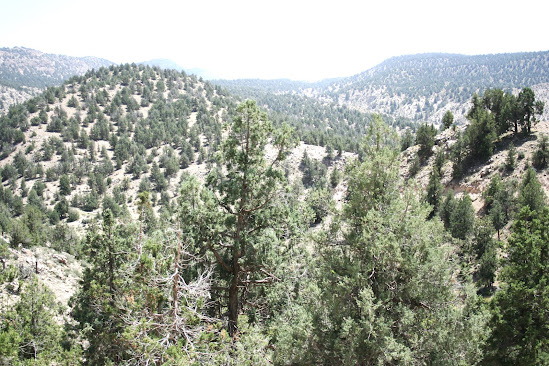At an altitude of 2,449 meters, Ziarat in Balochistan is a globally significant ecological and cultural treasure, home to one of the world’s oldest and largest juniper forests, spanning approximately 110,000 hectares. Known locally as “Living Forest Fossils,” these ancient trees are believed to be between 5,000 to 7,000 years old, making them among the oldest living trees on Earth. This unique ecosystem is critical for biodiversity, climate regulation, and the livelihoods of local communities, all while serving as a symbol of cultural heritage and environmental resilience. 
Ecological Significance
Ziarat’s juniper forests (Juniperus excelsa) represent one of the last remaining pure juniper ecosystems globally, second only to those in California, USA. These forests offer exceptional ecological value:
- Biodiversity Hotspot: The juniper ecosystem supports rare and endangered wildlife such as the Suleiman markhor (Capra falconeri megaceros), Balochistan urial (Ovis vignei blandfordi), black bear (Ursus thibetanus gedrosianus), and grey wolf (Canis lupus), along with the near-threatened Afghan mole-vole (Ellobius fusco capillus). It also hosts several migratory birds and unique plant species, more than 50% of which have medicinal and ethnobotanical significance.
- Climate Regulation: With its slow growth rate and long lifespan, the juniper ecosystem acts as a critical carbon sink, mitigating the effects of climate change. The forests also regulate groundwater recharge, conserving watersheds like the Narhi River, essential for sustaining agricultural productivity.
- Geological Importance: The forests, due to their immense age, hold invaluable data for understanding past climate change through dendrochronological studies.
Socio-Cultural Importance
Ziarat, meaning “Shrine”, is not just a natural haven but also a sacred site. The shrine of Kharwari Baba, a revered saint, attracts pilgrims year-round. The forests play an integral role in local traditions, from providing wood for ceremonial purposes to supporting livelihoods. Communities, predominantly Pashtun, Baloch, and Brahui, depend on the ecosystem for food, fodder, fuel, and shelter. The region is renowned for its high-quality stone fruits like apples, cherries, and peaches, which are marketed locally and internationally.
The cultural connections extend to practices like the use of juniper poles for grave markers and fire rituals, underscoring the forest’s role in preserving intangible heritage.
Ecosystem Services
The juniper forests of Ziarat provide a range of ecosystem services that are vital for local and global communities:
- Provisioning Services: Food, fuelwood, medicinal herbs, and grazing grounds for livestock.
- Regulating Services: Carbon sequestration, soil conservation, and watershed protection, which reduce the impacts of climatic hazards like floods and droughts.
- Cultural Services: Ecotourism opportunities, spiritual significance, and aesthetic value that attract visitors and researchers from across the globe.
Threats to Juniper Forests
Despite their importance, Ziarat’s juniper forests face severe threats:
- Deforestation: Unsustainable wood harvesting for fuel and ceremonial uses is degrading the forest.
- Overgrazing: Nomadic tribes and local herders rely on the forest for livestock grazing, causing soil erosion and habitat loss.
- Illegal Hunting: Poaching has fragmented wildlife populations, endangering key species like the Suleiman markhor and Balochistan urial.
- Invasive Species: Dwarf mistletoe has devastated large swathes of the forest, with limited understanding of its destructive potential.
- Climate Change: Rising temperatures and erratic precipitation patterns further stress the fragile ecosystem.
Call for Conservation and Research
The juniper forests of Ziarat are internationally recognized as one of Pakistan’s three fragile ecosystems, requiring urgent protection and restoration. Key recommendations include:
- Research and Monitoring: Comprehensive studies on biodiversity, ecological linkages, and socio-cultural impacts to better understand the ecosystem’s dynamics.
- Community Engagement: Empowering local communities through sustainable forest management practices and alternative livelihoods to reduce dependency on juniper resources.
- Policy and Legislation: Strengthening enforcement against illegal logging, hunting, and overgrazing while promoting reforestation initiatives.
- Global Collaboration: Raising awareness and fostering international partnerships to address shared ecological challenges.
A Global Model for Sustainable Conservation
The juniper forests of Ziarat exemplify the delicate balance between nature and humanity. By safeguarding these ancient trees and their ecosystem, we not only preserve a vital natural heritage but also ensure a sustainable future for the communities that depend on them. These living fossils stand as a testament to the resilience of nature and humanity’s responsibility to protect it for generations to come.
Prepared by Dr. Babar Khan & Yahya Musakhel (WWF-Pakistan, 2013-2019)







No comments:
Post a Comment